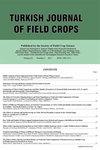盐害土壤中施氮和日本慢生根瘤菌对大豆农艺性状的交互作用
IF 0.8
4区 农林科学
Q3 AGRONOMY
引用次数: 0
摘要
土壤盐度对作物生产力产生了巨大的负面影响,导致粮食不安全和营养不良,尤其是在干旱地区。在2018年和2019年夏季进行了一项田间试验,以评估不同施氮量和接种日本慢生根瘤菌对大豆(Glycine max L)在盐碱地(EC 5.8 dS m-1)中农艺性能的影响。采用以下施肥处理:不施肥(对照),N0Р90К60,N30Р90А60,N60Р90К60单独或与日本血吸虫联合作为种子生物接种剂。试验采用裂区设计,以施氮为主,接种种子为小区,分三个重复进行。大豆生长、养分吸收和产量参数随施氮量的增加而增加,但接种种子的影响更为明显。与不接种种子的类似施肥处理相比,不接种化肥、N0Р90К60、N30Р90А60、N60Р90К60的接种处理的大豆产量在种植季节平均分别提高了20.4%、19.0%、34.1%和6.1%。因此,推荐N30Р90К60与日本血吸虫联合接种的施肥率作为本研究结果,因为大豆产量高,种子质量好,是盐胁迫条件下可持续农业生产的关键组成部分。本文章由计算机程序翻译,如有差异,请以英文原文为准。
Interactive effects of N fertilization and Bradirhizobia japanicum on agronomic traits of soybean (Glycine max L.) in salt affected soils
Soil salinity has enormous negative impact on crop productivity leading to food insecurity and malnutrition, especially in arid regions. A field experiment was conducted during the summer seasons of 2018 and 2019 to evaluate the effects of various N fertilization rates in combination with Bradyrhizobium japonicum inoculation on the agronomic perfor-mance of soybean (Glycine max L) in saline soils (EC 5.8 dS m-1). The following fertilization treatments were applied: no fertilization (control), N0Р90К60, N30Р90К60, N60Р90К60 individually and in tandem with B. japonicum as a seed bio-inoculant. The experiment in a split-plot design, N fertilization as the main plot, the seed inoculation as the sub-plot was set up in three replicates. Soybean growth, nutrients uptake and yield parameters increased with increasing N fertili-zation rate, however, the effect was more pronounced with the seed inoculation. Averaged over the cropping seasons, the soybean yield was higher by 20.4%, 19.0%, 34.1% and 6.1% in the inoculated treatments of no-fertlization, N0Р90К60, N30Р90К60, N60Р90К60, respectively as compared to the similar fertilization treatments without the seed inoculation. As a result, fertilization rate of N30Р90К60 in with association B. japonicum inoculation was recommended as this study outcome due to the high soybean yield and quality seeds as the crucial components of sustainable agricultural production under salt-stressed field conditions.
求助全文
通过发布文献求助,成功后即可免费获取论文全文。
去求助
来源期刊

Turkish Journal of Field Crops
AGRONOMY-
CiteScore
1.50
自引率
12.50%
发文量
21
审稿时长
>12 weeks
期刊介绍:
Information not localized
 求助内容:
求助内容: 应助结果提醒方式:
应助结果提醒方式:


